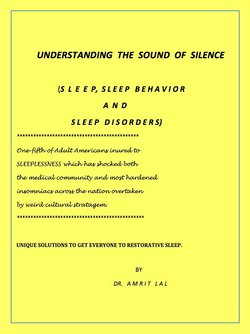Читать книгу Understanding the Language of Silence - Sleep, Sleep Behavior and Sleep Disorders - Dr. Amrit Lal - Страница 18
На сайте Литреса книга снята с продажи.
HORMONES – GOOD AND BAD
ОглавлениеSleep deprivation at night brings in its van increased daytime sleepiness, may cause mental confusion, cognitive impairment and other adverse consequences associated with inadequate sleep. It may interfere with one’s ability to handle day-to-day high-paced stresses of modernity and affect one’s ability to cope with chronic conditions. Those not sleeping well have a risk of gaining more weight because sleeplessness causes stress hormones to spike. They are thus at a greater risk of obesity which is a fore-runner of diabetes 2. If your sleep is collapsing, you are going to have spike in stress hormone – epinephrine. This causes both blood pressure and heart rate to go up with little chance for rest to your physiology and a higher chance for heart attack in the morning.
Postmenopausal women with breast cancer who routinely sleep less than 6 hours a night may be twice as likely to have more aggressive breast cancer compared with those who sleep longer hours, concludes a new study at Case Western University, Cleveland, Ohio US.
Stress hormone or cortisol, is secreted in the last half hour of the sleep. This explains why most patients of angina pectoris (a spasmodic choking pain the chest) take place in the wee hours of the morning. The same is true of another serious heart problem, myocardial infarction (heart attack caused by “death” of a part of the heart muscle) whose attacks peak between 5A.M. and 9.A.M. when a person waking up or is half awake. Again, when a patient is recovering from a heart attack the quality of sleep is poor and there is an increased number of arousals with delayed recovery time.
In 2012, the British Medical Journal reported a survey of 68,000 subjects in England and found that people with even mild depression have 29 percent increased risk of dying from cardio vascular disease and also 29 percent increased risk of dying from non-cancerous disorders. It may reiterated that people who are depressed are also likely to be candidates for hypertension, diabetes and obesity according to experts.
Among the hormones secreted during sleep, Cytokines, plays an important role in fighting infections, in particular, cold and flu. In a study of 153 men and women, Sheldon Cohen and colleagues at Carnegie Mellon University found that those who slept less than 7 hours a night were three times more likely to develop symptoms of cold when exposed to a cold-causing virus than those who slept eight or more hours.
